The Chinese Nationalist Party (KMT) yesterday appealed for unity as it sought to boost the election chances of Taipei mayoral candidate Sean Lien (連勝文) at an election eve rally, with dozens of speakers saying that the party, the city and the nation cannot afford to lose the election.
Held on Ketalagan Boulevard in front of the Presidential Office Building, the theme of the evening rally was “Taipei Sheng, Taiwan Win” (台北勝,台灣贏) — linking the election result of the capital city to the fate of the nation.
The slogan plays on the sheng character in Lien’s name “Sheng-wen” (勝文). Sheng means “victory” in Mandarin.
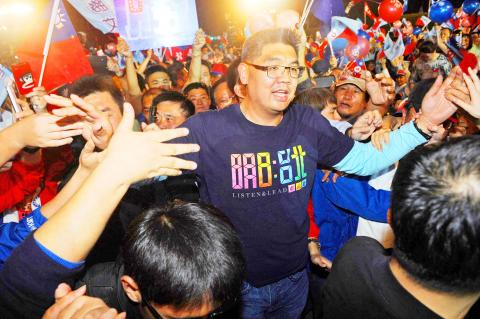
Photo: Chang Chia-ming, Taipei Times
New Party Secretary-General Lee Sheng-feng (李勝峰) was first to speak, highlighting the importance of the election to the future of the Republic of China (ROC), saying that a vote for Lien would be to defend the capital of the ROC.
Although Taipei has long been a stronghold of the KMT — voting patterns in past elections revealed a shift in blue-green support from 55-45 to 60-40 — Lien has consistently trailed his main rival, independent candidate Ko Wen-je (柯文哲), in opinion polls before Nov. 18.
To drum up enthusiasm among pan-blue supporters, President Ma Ying-jeou (馬英九) said that Taipei cannot afford to lose the election.
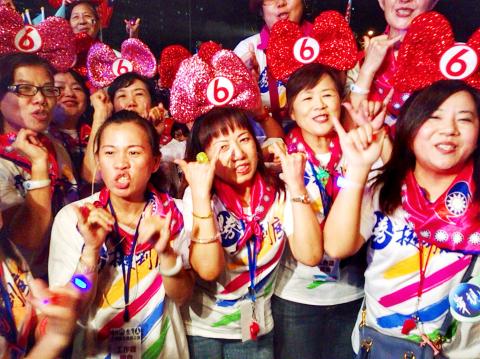
Photo: CNA
Taipei has developed into a “world-class capital” after 16 years of the KMT’s governance, starting when he was elected as Taipei mayor in 1998, Ma said.
Lien meets all the qualifications to become mayor of the capital because — as opposed to Ko — Lien has respect for women, is a professional with international vision and economic expertise, and he recognizes the so-called “1992 consensus,” which is essential to cross-strait relations, Ma added.
First lady Chow Mei-ching (周美青) urged everyone to cast their ballots.
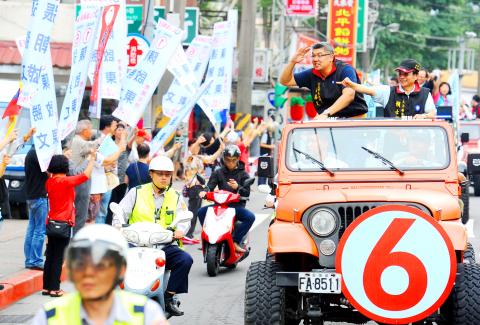
Photo: Chang Chia-ming, Taipei Times
“The election result has not only to do with you, but also Taiwan, your children and the future of the ROC. Cast your vote and vote for your future,” she said.
Lien appealed to young people in his speech.
“The problem Taiwan is facing is neither one of class nor generation. It’s the economy. I have the ability to improve the economy,” Lien said.
Other speakers included former KMT chairman Wu Poh-hsiung (吳伯雄) — who had not made a public appearance since suffering a stroke in September that kept him from stumping for his son, John (吳志揚), who is running for re-election as Taoyuan commissioner — and KMT Legislator Ting Shou-chung (丁守中), who lost to Lien in the April party primary.
Lien’s father, former vice president Lien Chan (連戰), said that the Taipei race was a battle crucial to the future of not only Taipei and Taiwan, but also the ROC.
“Only when we win the election can we continue to move forward as a free and democratic territory, defend the values of fairness and justice, and expect limitless prospects for cross-strait relations,” Lien Chan said.
People First Party (PFP) Chairman James Soong (宋楚瑜) had said that the party would not take sides in the election, but the KMT had Yeh Sung-nien (葉松年), head of the Friends of James Soong Association, stump for Sean Lien at the rally.
The KMT estimated the turnout at about 80,000 people.
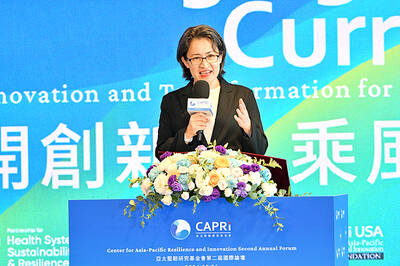
INSPIRING: Taiwan has been a model in the Asia-Pacific region with its democratic transition, free and fair elections and open society, the vice president-elect said Taiwan can play a leadership role in the Asia-Pacific region, vice president-elect Hsiao Bi-khim (蕭美琴) told a forum in Taipei yesterday, highlighting the nation’s resilience in the face of geopolitical challenges. “Not only can Taiwan help, but Taiwan can lead ... not only can Taiwan play a leadership role, but Taiwan’s leadership is important to the world,” Hsiao told the annual forum hosted by the Center for Asia-Pacific Resilience and Innovation think tank. Hsiao thanked Taiwan’s international friends for their long-term support, citing the example of US President Joe Biden last month signing into law a bill to provide aid to Taiwan,
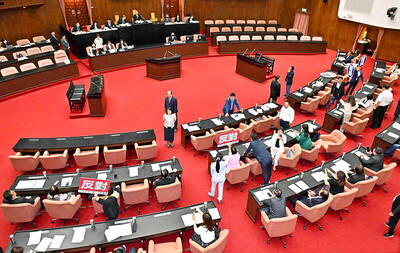
STATE OF THE NATION: The legislature should invite the president to deliver an address every year, the TPP said, adding that Lai should also have to answer legislators’ questions The Chinese Nationalist Party (KMT) yesterday proposed inviting president-elect William Lai (賴清德) to make a historic first state of the nation address at the legislature following his inauguration on May 20. Lai is expected to face many domestic and international challenges, and should clarify his intended policies with the public’s representatives, KMT caucus secretary-general Hung Meng-kai (洪孟楷) said when making the proposal at a meeting of the legislature’s Procedure Committee. The committee voted to add the item to the agenda for Friday, along with another similar proposal put forward by the Taiwan People’s Party (TPP). The invitation is in line with Article 15-2

Premier Chen Chien-jen (陳建仁) and the Ministry of Foreign Affairs yesterday denounced Chinese Nationalist Party (KMT) Legislator Hsu Chiao-hsin (徐巧芯) for making false allegations about donations to Ukraine and disclosing confidential documents, with the ministry saying that it would take legal action. The ministry last year signed an agreement with the Czech Republic on a healthcare project to assist Ukraine, which is to be carried out by the Czech Health Technology Institute. Hsu accused the ministry of being indirectly involved in the party politics of the Czech Republic as institute chairman Petr Foit is a local medical supplier, and has close political
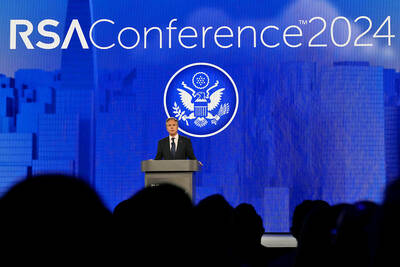
‘DIGITAL SOLIDARITY’: Taiwan, the US, Japan, Australia and New Zealand are to install and operate a cable that would connect up to 100,000 people in the Pacific Islands Taiwan, the US, Japan, Australia and New Zealand are working together to install undersea cables as a demonstration of digital solidarity, US Secretary of State Antony Blinken said on Monday. Blinken talked about the cooperation in a speech he delivered at the RSA Conference in San Francisco. He said that the US International Cyberspace and Digital Strategy launched by the US Department of State “treats digital solidarity as our North Star.” “Solidarity informs our approach not only to digital technologies, but to all key foundational technologies,” Blinken said. Under the strategy, the US is to work with international partners “to shape the design, development,